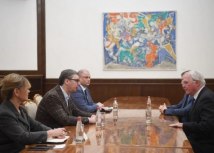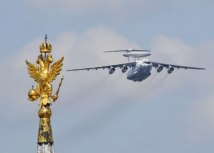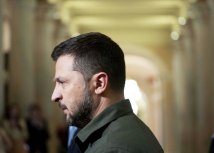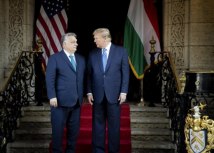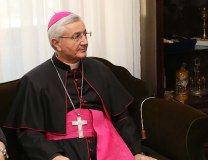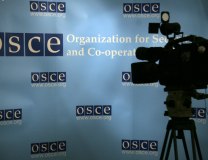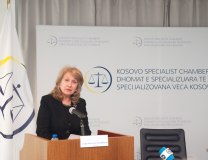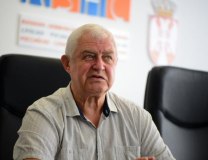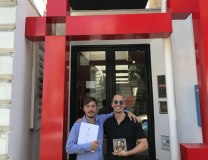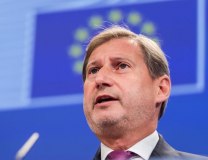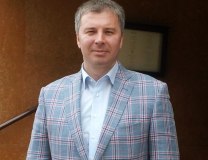Serb-Albanian ties "better than ever" - says Serbian PM
"I think that the relations between Serbia and Albania are doing better than any time. This is a very positive sign. Certainly, it is really, first and foremost, thanks to Prime Minister Edi Rama and President Aleksandar Vucic," the Prime Minister of Serbia, Ana Brnabic, has said.
Genc MllojaSource: Albanian Daily News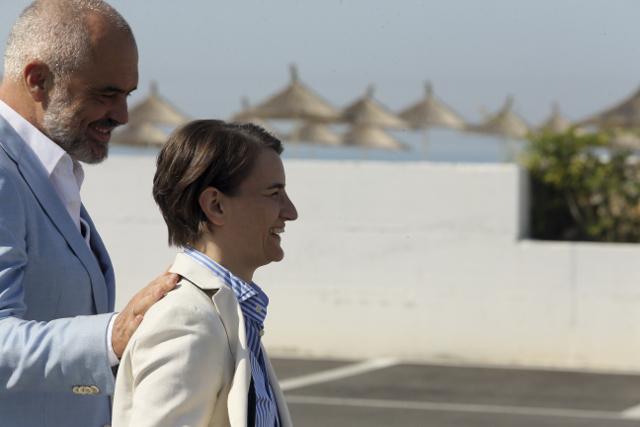
In an exclusive interview with Albanian Daily News on the sidelines of an informal forum on the Western Balkans initiative held in the western port city of Durres on August 26, hosted by Albanian Prime Minister Edi Rama, which was attended by his counterparts from Serbia, Kosovo, Bosnia and Herzegovina, Macedonia and Montenegro, as well as the EU Enlargement Commissioner, Johannes Hahn, and the World Bank Vice President, Cyril Muller, the Serb PM Brnabic, 41, spoke highly on the regional economic cooperation initiative of the Western Balkan countries that is already known as the Berlin Process for this region launched by German Chancellor Angela Merkel in August 2014.
In a comment on the EU sponsored dialogue between Belgrade and Pristina, the Serb PM, Ana Brnabic, said that "Dialogue is always good and it should be continued. Serbia is deeply committed to regional stability and we are open to continuing the dialogue with Pristina."
"It is very good that we have the support of the European Union, as well as of the countries that back the Berlin Process. And, first and foremost, the support of Germany and other countries that are participating in the Process," said Serbia's government chief in the interview which follows:
Your Excellency, thanking you very much for this special opportunity to have this exclusive interview with Albanian Daily News, would you be so kind to say a few words on the significance of this forum organized in Tirana after the Trieste Summit held on 12 July 2017?
First of all, thank you very much for the invitation to have this interview. I am happy to be in Albania. Durres is fantastic. I think that it is always important that the leaders of the region meet on regular basis, and the more we talk and the more we get to know each other, it will be easier to implement what we have started in the Berlin Process. I am kind of new to the process, but my predecessor, the current President, Aleksandar Vucic, has been very optimistic about the process and the needs to invest and work on the regional stability and economic cooperation. So in that respect I am continuing that work and we have met three times over the last few months. Trieste was very good, and the results are very good. We have signed some important agreements - one is on the action plan for the regional economic area and the establishment of the regional chambers of commerce. We also signed the trustful community treaty.
So this meeting in Durres is important because we need to sit down and see how to implement these things. Continuation of reforms, cooperation and strengthening of trust in the region are our priorities in which we should all work together. These are not only steps towards full EU membership, but above all the path to reaching the highest European values and a better life for all citizens of the region.
Which are the challenges for the implementation of the Economic Cooperation Agreement of the Western Balkans countries besides its benefits?
The challenges are many. But it is important that we want to address them. It is very good that we have the full support of the European Union, as well as of the countries that back the Berlin Process. And first and foremost, the support of Germany and other countries that are participating in the Process. But whatever the challenges are, if we are serious in implementing the plans that we have agreed on, then I think that it will be done.
So in terms of infrastructure projects our priorities remain the Nis-Merdare-Pristina-Tirana-Durres motorway ("Motorway of Peace"). It was also discussed the Transport Community of South East Europe, for which the agreement was signed at the Summit on the Western Balkans held in Trieste. Serbia has officially submitted its candidacy for the seat of the Secretariat of the Transport Community of Southeast Europe in Belgrade. It is an important transportation hub and has excellent connections with the whole region. It is time to establish an agreement on the seat of the Secretariat, which would demonstrate the whole region's determination to develop through intensifying cooperation in all areas.
In addition we have agreed that all the Prime Ministers in the region will appoint a person, who will work at all the regional chambers of commerce to monitor the implementation of the regional economic plan process. So if there is a lack of progress, then things will be addressed to the political level.
Speaking of Serbia- Albania ties, which is your assessment on them and which are your expectations for the future?
I think that the relations between Serbia and Albania are doing better than any time. That is a very positive sign. Certainly, it is really, first and foremost, thanks to Prime Minister Rama and President Vucic. They have developed a kind of a personal friendship, and this shows why it is important that we meet because that kind of friendship has been translated into economic and social agenda for both countries. So the visit of Prime Minister Edi Rama to Serbia, and also the economic business forums which have been held, have contributed a lot to the bilateral cooperation.
I know also that the President of Chamber of Commerce and Industry of Serbia, Marko Cadez, has often been in Albania as a guest meeting his Albanian counterparts to develop the ties in the frame of the bilateral overall economic and trade cooperation.
I am the new Prime Minister of Serbia and I fully intend to continue the bilateral relationship between our two countries building up on what President Vucic has started with Prime Minister Rama.
Your Excellency, which is your comment on the progress of the EU sponsored dialogue between Belgrade and Pristina?
Dialogue is always good and it should be continued. Serbia is deeply committed to regional stability and we are open to continuing the dialogue with Pristina.
I think that our President has been quite clear on that and as Prime Minister I am for that. As government we are deeply committed to that. I do not see any other way in making this region stable and unless we have a stable and predictable region, we have no good quality of life for the citizens of all of us.
I hope that Pristina will also remain open and committed to the dialogue. For us, as I said, a lot has been done to personal trust and relationship. The fact that we often meet, that we speak on regular basis, are indications that we do all these efforts to remove the obstacles. Our cooperation is probably the key step to move in the right direction.
Which are your impressions on Albania and its people?
This is my second time that I come to Albania. I have been in Tirana for a conference organized by the Minister, Mirela Harito, very recently. I was here as Minister of Public Administration and Local Government. We have cooperated a lot.
Mrs. Harito also visited me and my Ministry in Belgrade before that. It was another evidence that Serbia and Albania have closer ties, which is great. I have sincerely welcomed and applauded the work of Mrs. Harito and what the Albanian government has done in the terms of the service delivery to the citizens at the Trieste meeting.
I had a fantastic visit in Albania at that time and I can say that I had a fantastic visit today. And I am looking forward to coming back many, many more times in the future. I hope that Prime Minister Rama and the future ministers of the new government will soon come and visit Serbia.
In a nutshell, how do you see the situation in our region?
It is going in the right direction, but there is still a long way for us to go. You can see that we had Slovenia and Croatia having a border dispute about Piran Bay. Serbia and Croatia have still a lot of issues to be resolved. There are many open questions, which are not easy ones. Belgrade- Pristina dialogue will hopefully resume in the future and we will soon get to the full implementation of the Brussels' agreements. So, in my view, there is still a long way to go.
But there are growing ties, and I am optimistic about the future of the region, which, I think, has a lot of potentials. Cooperation, strengthening of relations with neighbors and continuation of reconciliation policy are important on the European path of our region. It would be a shame for all our citizens not to make full use of all of them.
